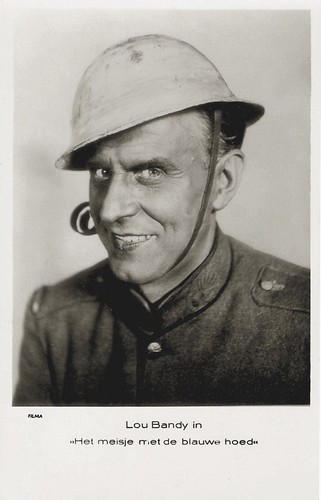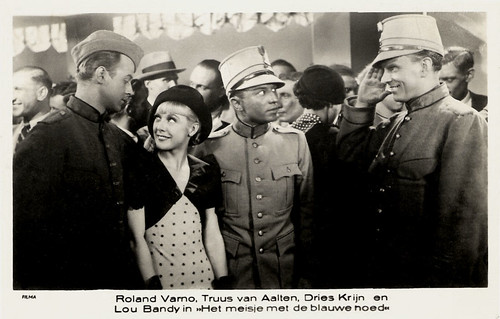
Dutch postcard by M. B.& Z. (M. Bonnist & Zonen, Amsterdam). Photo: Filma. Publicity still for Het Meisje met de Blauwe Hoed (1934).

Dutch postcard by M. B.& Z. (M. Bonnist & Zonen, Amsterdam). Photo: Filma. Publicity still for Het Meisje met de Blauwe Hoed (1934).
Standup comedian avant-la-lettre
Lou Bandy was born as Lodewijk Ferdinand Dieben in Den Haag (The Hague) in 1890. He grew up in a poor, working-class family as the youngest of a family of five children. He was the son of Franciscus Albertus Jacobus Dieben, a bricklayer, later a town clerk, and Frederika Wilhelmina Ninaber. Although there was poverty in the family, there was a lot of singing. When mother was not afflicted by headache attacks and depressive moods, she used to sing self-penned lyrics behind the washtub.
At school, a lot of attention was paid to singing and recitation. In these, Lou excelled more than in learning. After primary school, Dieben was successively piccolo in a hotel in The Hague, domestic servant with the Holland-America Line and street singer in London. In 1908, he served in the navy. After his service, Dieben went sailing again. Mobilisation in 1914 brought him back into military service. He was posted to the naval dockyard in Amsterdam. Among his mates, he was popular as a song singer and joker, but he found it difficult to conform to military discipline. For this reason, he was declared unfit for service in 1915.
In 1915, he made his stage debut in a variety show.He appeared with his four years older brother Wil as The Bandy Brothers. Their stage name was a phonetic anagram of their real surname Die-ben. The brothers separated soon because of their clashing personalities. Unlike Willy, Lou was known as a difficult person. Wil would become a popular entertainer in The Netherlands, known as Willy Derby. For the first three years, the lyrics of his songs were almost all by 'Ferry', lyricist Ferry van Delden
Lou continued under the name Lou Bandy. In 1921 Lou married the pianist and dancer Eugenie Küch. The German officer's daughter had a major impact on his career. She taught him neater manners, made him realise the importance of speaking in general Dutch and got him his first lucrative contracts. She would manage him to the top of the Dutch entertainment world. In 1927, their daughter Louise was born. In 1927, it came to a new collaboration with his brother Willy Derby. With their own company, they performed the grand revue 'Vergeet je me niet?'(Don't you forget me?) at the 'Trianon-Theater' in The Hague. The lyrics were by Ferry van Delden. Bandy and Derby performed separately, not as a duo. Apart from some banter back and forth, the collaboration went reasonably well. The revue was a great success in The Hague, but a subsequent tour was not long-lived.
In the following decades, Lou Bandy became a standup comedian avant-la-lettre. In the period between the two world wars, Bandy was one of the Netherlands' most popular artists. From 1931, Bandy was the crowd-pleaser for the revue company De Nationale Revue, which he traded to Jong Nederland in 1939. His trademark was a straw hat. Bandy became known to the public as a singer of cheerful lyrics, usually by Ferry van Delden or Philip Pinkhof (aka Rido). Among persons close to him, he had a less cheerful image. The anecdotes in which Bandy scolded his colleagues with a sour comment are numerous.

Dutch postcard by M. B.& Z. (M. Bonnist & Zonen, Amsterdam). Photo: Filma. Publicity still for Het Meisje met de Blauwe Hoed (1934).

Dutch postcard by R.E.B., no. 3. Photo: publicity still for Het Meisje met de Blauwe Hoed/The girl with the blue hat (1934).
Grand revues
As a celebrated artist, Lou Bandy was involved in the Dutch sound film early on. In 1929, he could be seen - and heard via a synchronised gramophone record - in one of the films Hofstad Film commissioned from well-known Dutch artists. Two years later, he acted in Zijn belooning/His Reward, the first short Dutch feature film with sound. In his biggest success, the army comedy Het meisje met den blauwen hoed/The Girl with the Blue Hat (Rudolf Meinert, 1934), he co-starred with the internationally known Truus van Aalten and Roland Varno. Lou played a dual role as Toontje, one of the soldiers, and as himself, Lou Bandy the variety artist. The film songs were written by Alex de Haas and Max Tak. Bandy recorded two of them, 'In de petoet'(In jail) and 'Vaste verkering is niets voor een soldaat' (No soldier should have a steady girlfriend), and they became popular hits.
In the flop Het leven is niet zoo kwaad/Life Isn't That bad (Haro van Peski, 1935), he costarred with Dutch film diva Fien de la Mar. Bandy was foremost a star of the revue and stayed so after the war. In 1940, he bought a villa in Doorn. He enjoyed spending time there and furnished the house with, among other things, a collection of paintings by Dutch masters.
In 1942, Bandy was arrested for anti-German provocation. This was because he had imitated Seyss-Inquart's limp walk during a performance. NSB members present among the audience reported the incident to the occupying forces. He spent a night in Scheveningen prison and was later transferred and interned in a hostage camp in Haaren. By simulating a heart condition, he was released. He also wrote a submissive letter to the occupying forces asking to be allowed to perform again. A short time later, he was arrested again and transferred to a hostage camp. There he attempted suicide. After being nursed, he returned home around Christmas 1942. He was put under house arrest and had to stay in Doorn. As a result, he did not perform again during the remaining war years.
In 1944, he suffered another setback. His wife Eugenie died in February and his brother Willy Derby in April. In the 1950s the grand revues became less fashionable and Bandy had to content himself with smaller gigs. He also started to work for the radio. He often performed at the very popular radio show De Bonte Dinsdagavondtrein (The Colourful Train of Tuesday Evening).
His life ended tragically. After the death of his wife in 1944, he had many escapades with young girls. Two such affairs ended in marriages: to Sinia Franke (1948-1949) and to the 43 years younger Carla van den Hurk (1952-1958). During the 1950s, Lou Bandy lost his public and after the divorce from Carla, he had to be treated in a psychiatric clinic. Alone in his flat in Zandvoort, he committed suicide in 1959. He was buried in the Old General Cemetery in Doorn (grave S-37) next to his first wife. Lou Bandy had one daughter from his first marriage, Louise (1928).
Scene from Het meisje met den blauwen hoed/The Girl with the Blue Hat (1934). Source: Johanpa3 (YouTube).
Campy clip of De zingende broeder singing Lou Bandy's evergreen 'Louise zit niet op je nagels te bijten' (Louise, Stop Biting your Nails). Source: De zingende broeder (YouTube).
Sources: Ben Leenders (Historici.nl - Dutch), Wikipedia (Dutch) and IMDb.
This post was last updated on 23 May 2023.
It seams a bit silly to have committed suicide at the age of 69. If he had just waited a few days....okay maybe a few weeks....surely he would have died of old age.
ReplyDeleteAgreed with Robin, but who knows.. maybe he just can't wait any longer.
ReplyDeleteYou Got A Posty
All Little Things I Like
Robin's comment is too funny. I forgot what I was going to say. Enjoyed the post!
ReplyDeleteWhat a wonderful entry. I thoroughly enjoyed your blog this morning. I had never heard of this wonderful fellow. I'm so sorry to hear he died the way he did.
ReplyDeleteAlways an interesting post when I visit. Thanks!
ReplyDelete